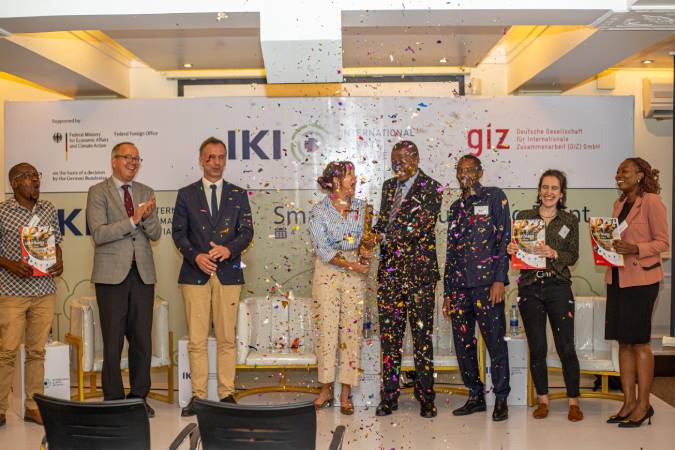
On 4/5 April 2023, IKI Small Grants officially launched three projects in Dar-es-Salaam. Their activities will contribute to the efforts of addressing biodiversity loss and climate change in Tanzania. The funding of the three projects amounts to 457,664 euros equivalent to 1.1 billion Tanzanian shillings. The launching event was officiated by the Head of Cooperation of the Germany Embassy and a representative of the Permanent Secretary of the Vice President’s office. Together with GIZ’s country director, representatives of the funded partnering organisations met for a fruitful launching and subsequent networking event. For further exchange, also organisations of the IKI Medium Grants programme were invited.
Tanzania is one of the countries with fast growing economies in Africa. Its economy relies on the climate sensitive sectors such as agriculture, livestock, fisheries, trade, tourism, and manufacturing. In addition, Tanzania is a very biodiversity-rich country hosting six out of twenty-five globally known biodiversity hotspots. This biodiversity richness is threatened by several drivers and pressures from anthropogenic activities such as habitat conversion, loss, degradation and fragmentation, and over-exploitation of species. The three IKI Small Grants projects, selected out of 450 applications, will contribute to tackle these challenges.
About the launched projects
The project ‘Empowering female fish workers for participatory coastal management’, implemented by Sea Sense, focuses on addressing marine biodiversity loss in selected coastlines of Tanzania. The project works towards mainstreaming marine biodiversity conservation and protection in local governance systems. Through capacity building at a local level, coastal communities are empowered to become agents of change for marine biodiversity.
The project ‘Developing risk awareness through joint action for the middle Msimbazi river’ aims to increase the adaptive capacity of local communities who live in poor quality housing in low-income informal settlements, prone to floods. The project works to increase the residents’ capacity to take action to mitigate the impact of severe weather on lives and property. In particular, the project aims at improving accessibility, understanding and mobilisation on the importance and use of weather and climate information. The Centre for Community Initiatives (CCI) developed and implements this project.
The third project works on strengthening multi-stakeholder cooperation in addressing climate change on the southern part of Tanzania where climate change seriously affects agriculture production. The project ‘Multi-stakeholder climate action plan in Njombe’ is implemented by Southern Highlands Participatory Organisation. SHIPO aims to increase awareness and participation of local stakeholders in implementing jointly agreed climate change and environmental conservation activities.

